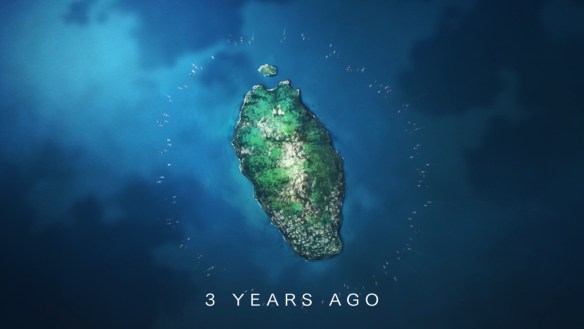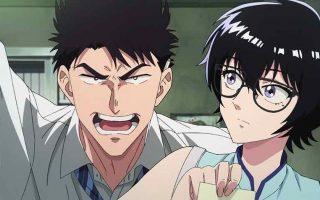Hello folks, and welcome back to Wrong Every Time. Today we’re checking out a new property I was recently commissioned, as we explore the first episode of the currently airing Solo Leveling. To be perfectly honest, I’m not entirely sure what to expect from this one, or how exactly it might be my sort of thing; the synopsis seems to indicate it’s basically a post-Sword Art Online riff on similar concepts, and I didn’t really have anything positive to say about the original Sword Art Online. “We’re growing stronger in a world that’s essentially a videogame” is a concept that has very little appeal to me; I prefer my fantasy worlds to be realized as genuine places, and am of the wrong generation to get a thrill out of watching someone else be excellent at a videogame.
In general, I see these works as the consequence of fans not reading broadly, or really at all; if you only consume videogames and light novels, you are almost categorically incapable of writing something rich enough to keep my interest. As for the staff, neither director nor art director nor series composer have any noteworthy credits to their names, but I imagine we’re in for some bombastic musical cues courtesy of the ever-excessive Hiroyuki Sawano. With almost no idea of what we’re getting into, let’s check out the first episode of Solo Leveling!
Episode 1
“3 Years Ago.” It seems this quasi-isekai falls into the “portals to another world suddenly opened in our own” category, like GATE. Hopefully this show’s a lot better than that one!
It’s funny, it wasn’t actually the onslaught of lousy isekai that eventually broke the camel’s back as far as formal reviews went; it was Don’t Toy With Me, Miss Nagatoro. The show isn’t exceptionally bad or anything, but I can still vividly recall watching it for a series review and thinking “I cannot waste another moment of my life cataloging the aesthetic qualities of someone else’s fetish material.” Couldn’t do it! Had to stop watching random stuff just because I was paid to review it, or risk burning myself out on anime altogether
Granted, it could have just as easily been an isekai. There isn’t a single show in this current wave I’d consider a meaningful addition to the medium’s canon – and having gotten more deeply into ‘70s and ‘80s anime, I can’t even say that’s just the natural result of only the top five percent of anything being good. The medium is absolutely suffering through a uniquely artless cultural moment
Anyway, Solo Leveling. There’s some battle going on on an island, and a nearby battleship’s commander is lamenting that “none of our weapons can do any damage to those things.” A preemptive answer to a common question in stories like this, emphasizing why this particular show’s form of weaponry is preferable to traditional firepower. The proud tradition of Minovsky Particles lives on
“We’ve got no choice but to leave this to the hunters.” Of course, that explanation chafes a bit as a reason why folks are wandering around the island in straight-up medieval getups, complete with swords and wizard staves. Isekai writers like European or Dragon Quest-esque fantasy worlds, but they don’t tend to like thinking about them very much; “we’re all fans of these games” is generally the underlying justification for their presence, which doesn’t lead to the most textured or thematically purposeful settings. Every stone in Lord of the Rings has a history and context; in modern anime, “that’s how it is in my favorite gatcha game” is considered context enough
The hunters are fighting some giant ants. It doesn’t go well for them!
“It’s no good! We’re too low-ranked to stand a chance!” Yeah, this whole system of being self-conscious of your game stats just never works dramatically. It feels wildly artificial, and also just plain boring. If the author didn’t bother caring about the substance of their world, why should I? There are infinite realms of fantasy with rich worlds that actually reward further investigation, and whose specific worldbuilding choices neatly echo their stories’ larger ideas – I’m not gonna be reading “what if I was the best in the world at World of Warcraft” when I could be reading Ray Bradbury or Terry Pratchett
Suddenly, a high level cleric appears and saves them!
“Amazing, he healed me in an instant.” Is that amazing? That’s another thing about this sort of worldbuilding – nothing really feels substantive, because it’s all based on arbitrary background numbers rather than tactics or emotional journeys. I wouldn’t call Robert Jordan a great writer or anything, but at least The Wheel of Time understood how to establish stakes and seed character growth
Apparently he’s an S-rank hunter, accompanied by two others. Then a giant white ant appears!
“I don’t think that’s the boss.” I suppose it is what it is. The next generation of anime fans respond positively to stories about playing videogames, so that’s probably what we’re getting from here out, but that doesn’t mean the classics don’t still exist, or that artists of genuine vision and skill aren’t out there sculpting Sonny Boys and Heike Stories
Some nice cuts as they defeat this monster – very aggressive distortions of form accompanied by a low drawing count, creating a sort of Kaneda-style sense of speed and impact
“Guildmaster Choi, whenever you’re ready!” It’s certainly a funny thing to have arrived at this point where so many arbitrary genre tropes are just taken for granted. No logical reason for soldiers to have formed into “guilds” here, that’s just how it is in MMOs. They’re not even riffing on medieval worldbuilding – they’re riffing on videogames’ riffs on medieval worldbuilding, wherein the generally craft-based system of guild artisans is reframed as independent alliances of players
Oh no, even more ants!
Apparently these gates appeared over ten years ago, in fact
“The other side of each gate teemed with creatures called “magic beasts,” who were immune to conventional weaponry.” I was clearly born in the wrong era – I was writing this sort of hack “then my guys fight the monster guys” stuff in middle school, I just wasn’t posting it online. Granted, even then I was probably too focused on character drama to really captivate this “I want to be the strongest hero who beats up all the monsters” crowd, nor was my work so creatively barren as to rely on videogame worldbuilding
“Once these powers have awakened, no amount of effort can ever result in greater strength.” A system that speaks to the anxieties underlying this whole genre wave, a fear of being left behind and unable to compete in an arbitrary modern world. Given that, the allure of escaping to a videogame world where clear efforts earn clear dividends is naturally compelling – and given our protagonist’s current status at the bottom, it’s clear his superpower will be his ability to rise through these ranks, conveying the fantasy of overcoming society’s judgment and succeeding on your own merits. Like Chainsaw Man and many other stories, the impoverished nature of this fantasy really speaks to how fully the real world has ground us down, to the point where our most lofty fantasies are things like “the effort I put in at work gets appreciated”
We then jump to the present day, wherein folks are gearing up for the day’s raid. Not really sure why we did that whole “three years earlier” cut in the first place, given it was just a random battle starring characters we don’t know. I suppose just to get some action in early, but beating up giant ants isn’t exactly my idea of thrilling conflict
One guy just got back into raiding due to his wife’s pregnancy, and wonders if he’s still in shape. Sorry dude, you’re definitely dying today
Our hero Sung arrives, looking much like every other Kirito replica. His nickname is “The Weakest Hunter of All Mankind,” which seems a little mean
His name is Jinwoo, and apparently a girl named Joohee is worried about him. Guessing she’s dead too, which will precipitate some sort of reflection from our hero on how it sucks to be powerless, which will in turn precipitate him awakening to his powers. Not particularly hard to write one of these things
“It’s my fault for being so weak.” Having your strength be tied to some arbitrary number just seems fundamentally antithetical to interesting conflict. No strategy, no outwitting your opponent, no clash of uniquely defined abilities, just “is my number big enough to beat your number.” They have adapted what is most boring and formulaic about games back into a medium that was itself dumbed down and formalized in order to originally work as game design, losing what is genuinely fantastical about fantasy in the process. Gandalf’s powers being ill-defined isn’t a failing, it is a strength of the written word, allowing magic to truly feel eerie and limitless. You don’t have to use numbers when you’re writing prose, but so many of these writers only understand numbers, not prose or imagination
Elsewhere, some corporate head of a hunter association is musing on the “essence stones” collected from magical beasts
Some solid character choreography as Jinwoo gets absolutely wrecked by a goblin
“The essence stones collected from these beasts can be turned into powerful weapons and gear for fighting other beasts.” It appears our author has played Monster Hunter
But apparently the government’s interested in them as a clean energy source! Alright, now I’m sitting up, there might be a theme approaching here
“I guess it’s over. And all I have to show for it is an E-rank essence stone. Hardly worth dying over.” Another beat that’s gilded with a touch of thematic heft, reflecting the cruel bargain of modern society
They find another dungeon attached to their own. The leader advises caution, but the group want to progress – again, I like how “he’s got another kid on the way” is such a grounded cause for recklessness, tethering these isekai themes directly back to their real-world analogues
And of course, Sung casts the deciding vote for exploring this annex, which will ultimately make him feel responsible for all their deaths
“Now that Dad’s gone missing, I’m the only one who can provide for my family.” Like the other guy with his kid on the way, the financial constraints of modern society are what is truly oppressing Sung, and forcing him into these reckless pursuits of glory
Elsewhere, hunters are being asked to touch The Orb, while other recruiters attempt to sign contracts with B- and C-rank hunters. Making isekai’s underlying capitalist metaphor explicit continues to be this show’s cleverest trick
Apparently “Guildmaster Choi” from that initial flashback now controls a massive hunter organization
Meanwhile, cool beauty and expert hunter Cha Hae-in effortlessly dispatches some purse snatchers
But she’s so flustered! Could we know a man sensitive enough to disarm her anxious personality? I think we just might!
Back in the dungeon, Joohee reprimands Sung for his reckless choice to continue the dungeon crawl
“Well in that case, maybe you should treat me to show your gratitude.” Oh no, she’s asking him out! It’s her last day on the force! She’s three days away from retirement! Anyway yeah, classic trick for ratcheting up the sense of tragedy or missed opportunity right before you kill someone
“If you want to survive, this advice will serve you above all else: please, be afraid.” Nice contrast of the president’s speech and this fateful door opening
I swear to god it better not be ants behind that door
It’s not ants, whew. It’s a chamber lined with massive statues and inscriptions of laws that intruders must follow. I like the implication of some grand alternate theology existing within these portal worlds – that’s genuine fantasy, not just game variables
“Most hunters buy powerful gear with the treasure they find. But this cheap knife is all I can afford. If it breaks, I have to fight empty-handed.” This is one point where the fantasy tends to lose me – it’s a personal escape based on personal grievance, not a call to solidarity. Your peers are frequently framed as opponents who are getting unfair advantages, rather than fellow victims of capitalism; it’s a flattering but ultimately insular and self-defeating perspective
And Done
Welp, that was Solo Leveling! Pretty much what I expected – a standard isekai with reasonably impressive production values, alongside all of the narrative tropes that tend to make me uninterested in the larger genre. The drama was too gamified and predictable to really engage me, but I certainly didn’t find it to be an unpleasant watch or anything, just not a particularly compelling one. When a fantasy story’s worldbuilding is this underwritten, it falls to the characters to carry the drama, but Song unfortunately doesn’t feel any different from the standard underdog protagonist you tend to see in these features. A perfectly reasonable iteration of this story for its intended audience, but nothing that someone outside of that crowd needs to bother with.
This article was made possible by reader support. Thank you all for all that you do.




